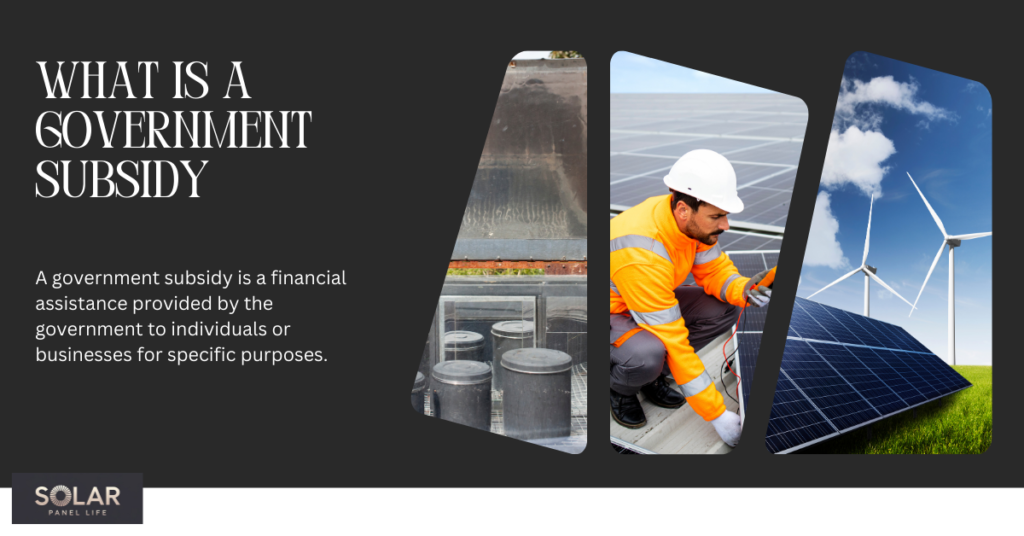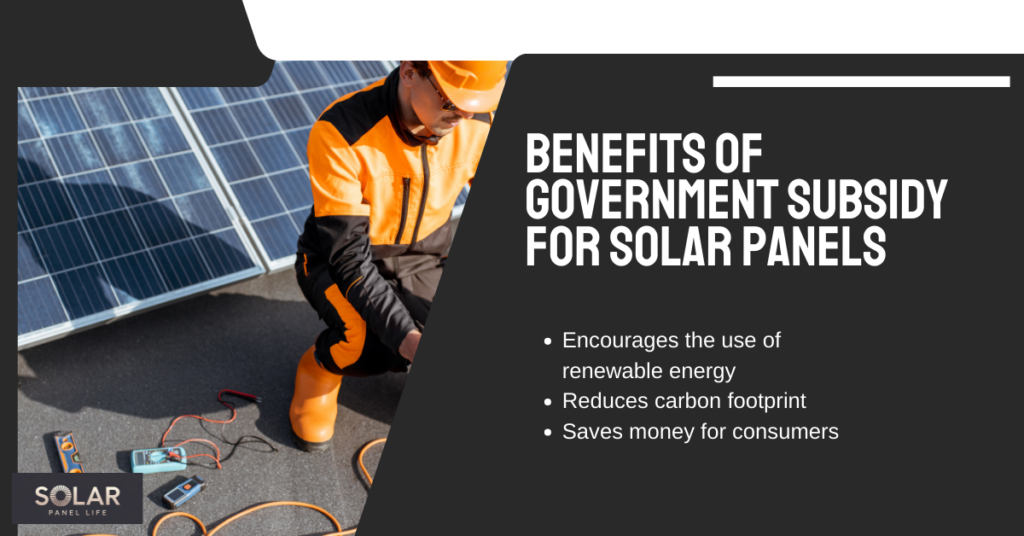Introduction
In recent years, there has been a growing interest in alternative sources of energy such as solar power. This is due to the increasing awareness of the negative impact of traditional fossil fuels on the environment and the need for sustainable energy solutions.
One way to encourage individuals and businesses to invest in solar panels is through government subsidies. In this article, we will explore the concept of government subsidies for solar panels and whether or not they exist.
What is a Solar Panel?
A solar panel, also known as a photovoltaic (PV) panel, is a device that converts sunlight into electricity. It is made up of multiple interconnected solar cells, which are typically made of silicon and other materials capable of absorbing sunlight and converting it into electrical energy. Solar panels can be installed on the roofs of buildings or in large arrays on open land to harness the sun’s energy and generate electricity.
So, by installing solar panels, you can harness clean and renewable energy to power your home or business while reducing your carbon footprint. Additionally, any excess energy produced by your solar panels can be fed back into the grid, making you a contributor to the overall production of green energy. Overall, solar panels are an increasingly popular and effective way to reduce reliance on non-renewable energy sources and promote a more sustainable future.
So if you are considering making the switch to solar power, be sure to explore all available subsidies and incentives to help make it an affordable investment for your home or business. Let’s harness the power of the sun and work together towards a cleaner, greener world for generations to come.
Keep advocating for government support and policies that promote the use of renewable energy sources like solar panels, and let’s make a positive impact on our environment. The future is bright with solar energy!

What is a Government Subsidy?
A government subsidy is a financial assistance provided by the government to individuals or businesses for specific purposes. The goal of subsidies is to promote certain activities or industries that are deemed beneficial to the overall economy. These can include tax breaks, direct payments, and reduced interest rates.
In the case of solar panels, government subsidies can help to offset the costs associated with installing and using them. This makes it more affordable for individuals and businesses to invest in solar energy.

Benefits of Government Subsidy for Solar Panels
There are several benefits to having a government subsidy for solar panels:
- Encourages the use of renewable energy: By offering financial assistance, the government is promoting the use of clean and renewable sources of energy.
- Reduces carbon footprint: Solar energy does not produce greenhouse gases, making it an environmentally friendly alternative to traditional fossil fuels. Government subsidies can help to reduce the overall carbon footprint of a country.
- Creates jobs: The growth of the solar energy industry can create new job opportunities in installation, maintenance, and manufacturing.
- Saves money for consumers: Solar panels can help to significantly reduce electricity bills for consumers. With government subsidies, the initial investment cost is also reduced, making it an even more attractive option for individuals and businesses.
- Increases energy independence: By investing in solar energy, countries can reduce their dependence on imported fossil fuels, making them more self-sufficient
- Promotes economic growth: The solar energy industry can stimulate economic growth by creating new business opportunities and increasing the demand for solar products. This can also lead to a decrease in the cost of solar panels due to economies of scale.
- Provides long-term benefits: Solar panels have a lifespan of 25 years or more, making them a long-term investment with significant returns. Government subsidies can make this investment even more profitable for individuals and businesses.
- Supports innovation: With government subsidies, there is an incentive for companies to invest in research and development to improve solar technology. This could lead to advancements in the efficiency and affordability of solar panels.
- Mitigates the effects of climate change: Solar energy is a clean, renewable source of energy that does not contribute to climate change. By promoting its use through subsidies, governments can play an active role in reducing the harmful effects of greenhouse gas emissions.
- Improves energy security: Solar panels are decentralized sources of energy, meaning they can be installed on individual buildings or homes. This helps to create a more resilient and reliable energy grid, reducing the risk of power outages during extreme weather events or other emergencies.
- Supports low-income households: Government subsidies for solar panels can make them more accessible to low-income households, providing them with an affordable and clean source of energy. This can also help to reduce the overall income inequality gap.

Types of Government Subsidies for Solar Panels
There are several types of government subsidies that may be available to individuals or businesses interested in investing in solar panels. Some of the most common types include:
- Tax Incentives: Governments may offer tax credits or deductions for expenses related to purchasing and installing solar panels. These can significantly reduce the upfront costs of installing solar panels and make them more affordable for individuals or businesses.
- Feed-in Tariffs: This type of subsidy involves the government paying individuals or businesses for the excess energy produced by their solar panels. This can help offset the initial investment and provide a steady stream of income for years to come.
- Grants: Governments may also offer grants to individuals or businesses for the purchase and installation of solar panels. These grants do not need to be paid back and can cover a significant portion of the initial costs.
- Rebates: Similar to grants, rebates are financial incentives provided by the government for investing in solar panels. However, these typically require individuals or businesses to pay upfront and then receive reimbursement later on.
- Low-interest Loans: Governments may also offer low-interest loans specifically for the installation of solar panels. These can help to reduce the overall cost of financing and make solar energy more accessible to a wider range of individuals and businesses.
- Direct Payments: In some cases, governments may provide direct payments to individuals or businesses for installing solar panels. These payments can cover a portion of the upfront costs and help to make solar energy more financially feasible.
- Net Metering: This type of subsidy allows individuals or businesses to sell excess energy produced by their solar panels back to the grid, essentially reducing their electricity bills. This encourages the use of solar energy and can also generate additional income for those who choose to invest in it.
- Sales Tax Exemptions: Some governments may offer exemptions from sales tax for solar panel purchases, reducing the overall cost of investment.
- Renewable Energy Credits: These credits can be sold to companies or individuals who want to offset their own energy use with renewable sources. This allows individuals and businesses with solar panels to generate additional income.
Overall, government subsidies for solar panels can have a wide range of benefits and contribute to the growth of clean and renewable energy sources. By promoting the use of solar energy, governments can not only reduce carbon emissions but also help to create a more sustainable and economically prosperous future.
So, it is important for governments to continue supporting and investing in solar panel subsidies as part of their efforts towards a greener and more sustainable future. With advancements in technology and a growing global awareness about the importance of renewable energy, it is likely that government subsidies for solar panels will continue to play a significant role in promoting the use of clean energy sources.
Moreover, as the demand for solar panels increases, there may be further developments in various types of subsidies and incentives to make them even more affordable and accessible to a wider population. This could include targeted subsidies for low-income households, special programs for businesses, or even larger tax breaks.
By continuously evolving and adapting government subsidies, we can ensure that solar energy becomes a mainstream source of energy, leading us towards a more sustainable and environmentally friendly future. Ultimately, the benefits of solar panel subsidies extend far beyond just financial savings for individuals and businesses.
They also contribute to a cleaner environment, improved energy security, and a more equitable society. Governments must continue to prioritize and support these initiatives in order to create a more sustainable and prosperous future for all. So, let’s continue investing in solar panel subsidies and reap the long-term benefits for our planet and future generations.
Do Government Subsidies for Solar Panels Exist?
The answer to this question varies depending on the country and region. In some places, government subsidies for solar panels are readily available and widely promoted, while in others, they may be scarce or non-existent. Let’s take a closer look at some countries and their approach to government subsidies for solar panels.
- United States
In the United States, there are various federal and state-level subsidies available for solar panels. The most significant one is the federal Investment Tax Credit (ITC), which offers a tax credit of 26% of the total cost of installing solar panels. This credit will decrease to 22% in 2023 and will be eliminated for residential installations after that. However, businesses can still claim a 10% tax credit after 2023.
Apart from the ITC, states also offer their own subsidies, such as rebates and tax exemptions. These can vary greatly from state to state, with some offering more comprehensive incentives than others.
- United Kingdom
In the UK, the main government subsidy for solar panels is the Feed-in Tariff (FiT) program. Under this scheme, individuals or businesses can receive payments for every unit of energy generated by their solar panels. The rates for this program are reviewed annually but are guaranteed for 20 years once the installation is completed.
Additionally, the UK government also offers a Green Homes Grant, which provides vouchers to cover two-thirds of the cost of energy-efficient home improvements, including solar panels.
- Australia
Australia has a mixed approach to government subsidies for solar panels. The federal government offers Small-scale Technology Certificates (STCs), which are financial incentives based on the amount of electricity generated by your solar panel system. These certificates can then be sold to recoup some of the initial investment costs.
State governments in Australia also offer their own subsidies, such as rebates and interest-free loans.
- India
In India, the Ministry of New and Renewable Energy (MNRE) offers various subsidies to promote the use of solar energy. These include capital subsidies for rooftop solar installations, interest subsidies on loans for renewable energy projects, and other incentives for manufacturers and businesses.
Apart from government subsidies, India also has a net metering policy that allows individuals or businesses to sell excess energy generated by their solar panels back to the grid at a fixed rate.
Benefits of Government Subsidies for Solar Panels
The availability of government subsidies for solar panels can have several benefits for individuals and businesses, including:
- Affordability: With the help of subsidies, the upfront costs of installing solar panels are significantly reduced, making them more affordable for a wider range of individuals and businesses.
- Incentive to Invest: Government subsidies can act as a strong incentive for people to invest in solar panels, leading to increased adoption and reduced reliance on traditional fossil fuels.
- Cost Savings: With lower upfront costs and potential income from feed-in tariffs, individuals and businesses can save money on their energy bills in the long run.
- Environmental Impact: By promoting the use of renewable energy sources, government subsidies for solar panels can contribute to reducing carbon emissions and mitigating the negative impact of traditional energy sources on the environment.
Summary
In conclusion, government subsidies for solar panels do exist in various forms and can provide significant benefits for individuals and businesses looking to invest in sustainable energy solutions. However, availability and eligibility for these subsidies may vary depending on location and other factors.
It is essential to research and stay updated on government incentives in your area to take advantage of them and help create a cleaner, more sustainable future. So if you are considering investing in solar panels, it is worth exploring the available government subsidies that could make it an even more attractive option.

